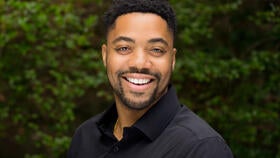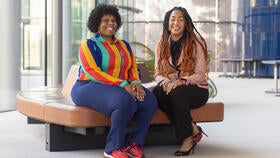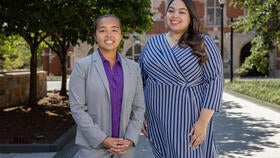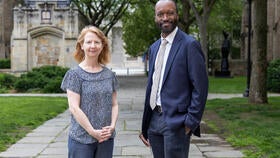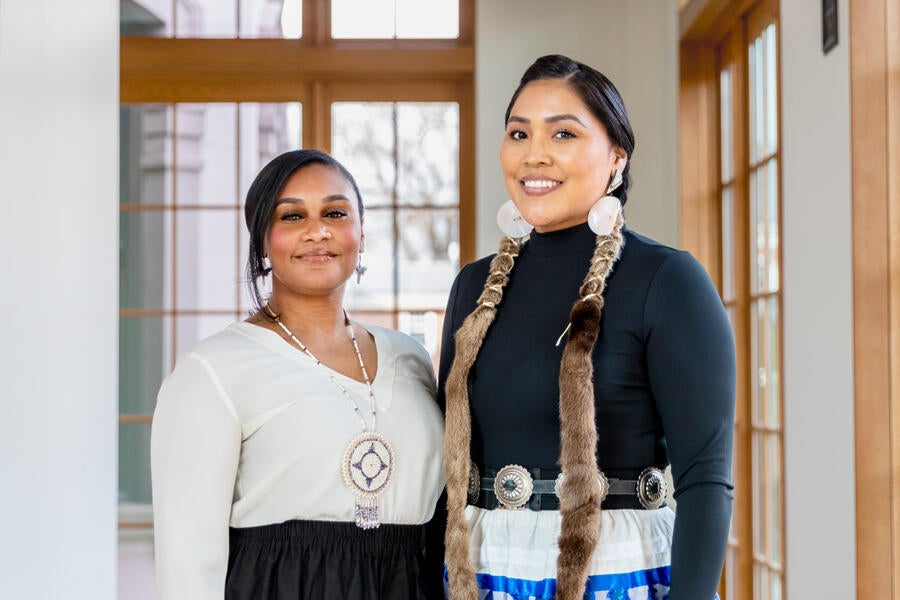
The Indigenous Leaders at Yale (ILY) affinity group made its debut in November 2023. ILY co-founders and co-chairs Jennifer Rawlings and Diana Onco-Ingyadet are deeply committed to creating a welcoming community for Yale staff who identify as Indigenous. With the support of the Office of Diversity and Inclusion and co-founder Cayetana Navarro, they successfully launched ILY and continue to build membership and programming.
Rawlings is a member of the Seaconke Wampanoag Tribe and the Pokanoket Nation. Throughout college, she was involved in the Native American cultural centers at the University of Massachusetts Amherst and Quinnipiac University. After graduating from law school, she worked in small law firms and quickly discovered that “litigation life” was not her career path.
As senior contract manager in the Office of Sponsored Projects, Rawlings is responsible for negotiating research contracts that allow Yale faculty and research staff to work with external parties on a wide range of science and research projects. At Yale since 2017, Rawlings enjoys the negotiation process, finding words and word choice fascinating, and relishes her part in enabling faculty to do “great science and research.”
Onco-Ingyadet is Navajo, Kiowa, and Comanche and part of the Navajo and Comanche Nations and the Kiowa Tribe of Oklahoma. She received her doctorate in Organizational Change and Leadership from the University of Southern California. Before coming to Yale as the assistant director for the Native American Cultural Center, Onco-Ingyadet’s professional experiences included working at a large public university, an educational non-profit, and as an elementary school teacher.
Onco-Ingyadet is the associate director of Academic Affairs for the Yale Young Global Scholars (YYGS) program where she manages four academic-track programs that are offered to high school students each summer. She also recruits for YYGS and hopes to bring more Native American students into this program.
How did you get involved with the Indigenous Leaders at Yale?
Rawlings: In 2022, Deborah Stanley-McAulay, associate vice president of employee engagement and workplace culture, connected me with several individuals across campus who had expressed interest in building an Indigenous community. My family had always been active in New Haven, bringing Native American people together and increasing the visibility of this community. Deb and I agreed it was time to mobilize Indigenous faculty and staff here at Yale. When I met Diana, I immediately saw that her enthusiasm and energy for building this community matched mine.
Onco-Ingyadet: In July 2021, I reached out to Deborah Stanley-McAulay and shared with her that I had yet to see a space dedicated to Indigenous staff. The only Indigenous employees I knew about were myself and my supervisor. It was hard to identify these folks, so I volunteered to find other community members on campus. It can be difficult in the beginning to get the ball rolling. Thankfully, Deb connected me with Jen and Cayetana, and we built off each other’s strengths and together we launched ILY.
What kind of support does this affinity group offer, and who is it for?
Rawlings: ILY is for staff and faculty who identify as Indigenous and their allies—who may be non-Indigenous. Family is a fundamental aspect of our culture, so when we have events, we want members to bring their families and children. The Yale campus is so large, and people are often siloed in their departments. One of our goals is to let folks know we are here and there is a space for them. The Indigenous community is diverse, and we all look very different, so by spreading the word about our existence, members can learn about what is happening as we build this community and bring people together.
Onco-Ingyadet: The initial part of this process is creating space for community gathering and connection. Having a space where members can meet and connect in a safe environment is at the heart of what we do. Additionally, we want to recruit and retain staff who identify as Indigenous by providing professional growth opportunities for our members. Also, we would like to open ILY up to allies and the local community through social and other events.
How has your experience with Indigenous Leaders at Yale affected your career?
Rawlings: It has made me feel more confident about bringing this part of my identity into the workplace. I have made many new connections and grown my professional network. I’m now auditing a class at the law school called Federal Indian Law, taught by one of our members, whom I met while forming this group. I never thought I’d return to school. It’s been a phenomenal experience.
Onco-Ingyadet: I’m originally from Oklahoma, and I went to college and worked in Arizona and New Mexico. It never occurred to me to move to the East Coast. When I first relocated here, the transition was tough. However, through this group, I’ve found a community that makes me feel like I’m building some longevity here. For me, it’s about building a community and finding a sense of belonging for myself and others. ILY has allowed me to bring my true, authentic self to work every day.
What have you accomplished or hope to achieve as a founder/chair?
Rawlings: We launched this affinity group and have begun to make invaluable cross-campus connections. Our members love that we are building this community. It’s a process, but we are off to a great start. I hope to raise awareness of the local Indigenous community in the Yale community. My tribe is from the Massachusetts/Rhode Island area, and we are an active living culture. There is a perception that the Native American community in New England is dormant; that is not true. I want the local and Yale communities to know that Native American people are living in this area today.
Onco-Ingyadet: The most significant thing has been the establishment of ILY and providing the Indigenous people a place to meet and connect with others. It’s been exciting and heartwarming to meet and learn about all our members who work in various departments across campus. We have a speaker series during which members talk about their work or share something about themselves. In the future, we want to increase awareness and membership and create connections with the New Haven community, learn from them, and support their causes as well.
Yale’s affinity groups are supported by the Office of Diversity and Inclusion under the leadership of Deborah Stanley-McAulay, associate vice president of employee engagement and workplace culture. Each of the nine groups supports recruitment, retention, education, advocacy, and community building.



